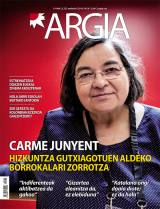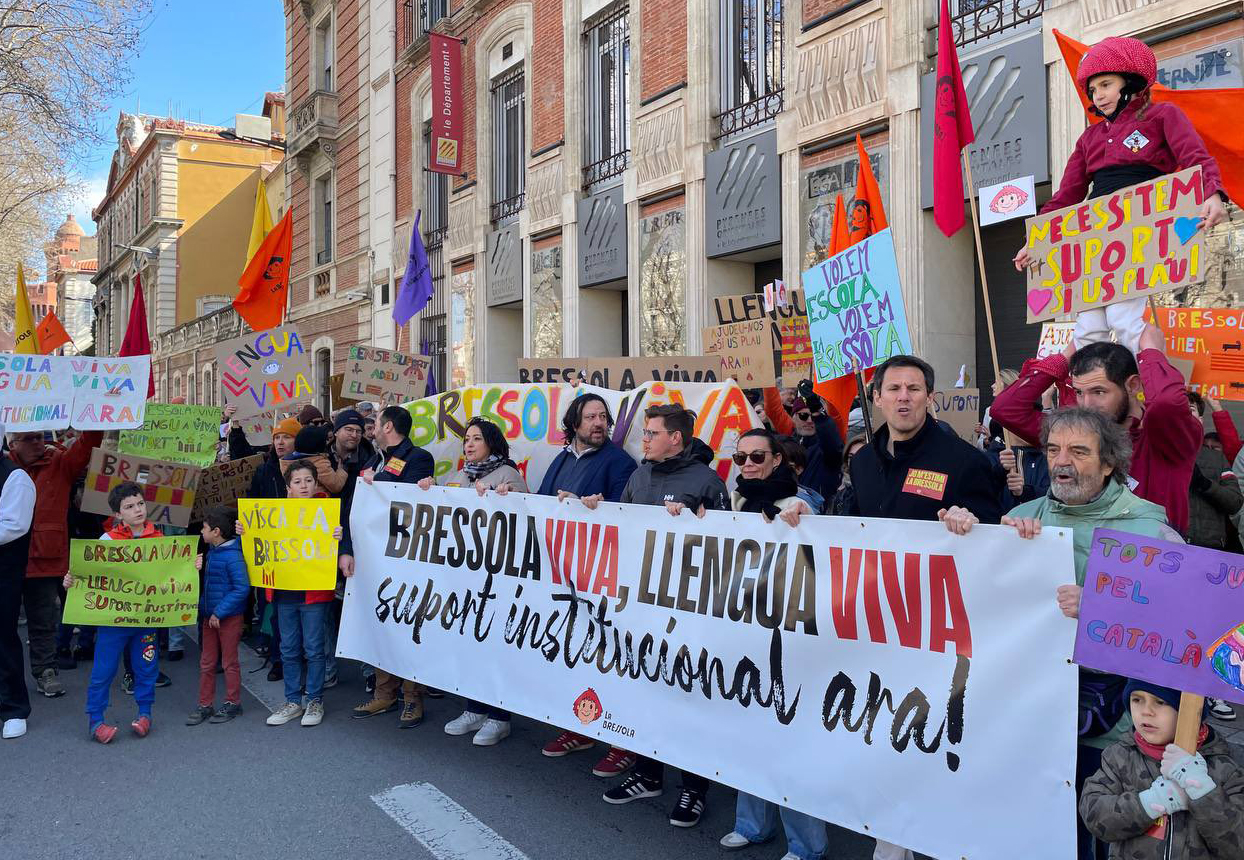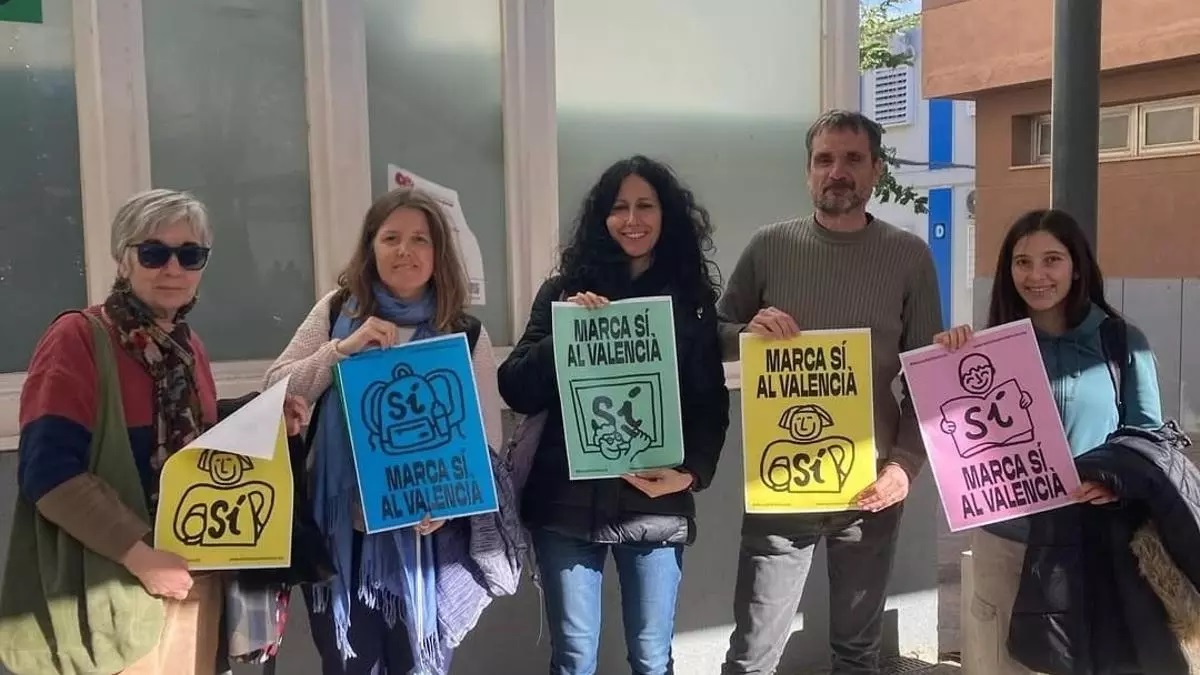"Language kills indifference, not enemies against language"
- On September 21, Professor of the University of Barcelona, Carme Junyent, gave a lecture at the Faculty of Letters of the University of the Basque Country in Vitoria-Gasteiz, in the presentation of the cycle Hitz adina mintzo, organized by Oihaneder Euskararen Etxea. Before talking about the death of languages, Junyent highlighted the quality of that cycle, praised the excellent level of experts and invited all listeners to participate in all sessions.

In his speech at the University, Carme Junyent talked about the death of languages, but the first surprise came when he spoke in Catalan and dedicated himself to it. That's where we've come back to the conversation.
Your speech in Catalan.
They proposed it to me, and I had no problem. You have to take into account the context of the conference, I was talking about people worried about linguistic diversity, and what Catalan is, I wanted to show that the work of intercomprehension is a way of helping to survive languages. In fact, it's not a little help. We do not expect all people to learn all the Romanesque languages – the Romanesque ones, in our case – but it is also true that those of us who speak one of the Romanesque languages are in a position to understand the rest of the Romanesque languages sufficiently. It is enough for us to make a small, not too large, effort to adapt.
It's a small effort.
Yes. Linguists act this way on many occasions. In the way of expression, it does not even make a day with four Japanese linguists. We wonder how we could do it without using English, which is always easy, is the first solution that is invented. Among the linguists was one who knew how to speak in Catalan and, of course, spoke in Catalan. The second, which works in Belgium, knows French and communicated in French. The third one knew Occitan, and so he talked. The fourth, which did not know the Romanesque language, was expressed in Esperanto. By publishing the book, the articles appear in four languages, and on the other hand, Catalan has been translated into Japanese. And they were all happy. If we had done it in English, I tell you the truth, I would have had no interest, no one would have attended the days. With these facts we see that the survival of languages and their diversity are possible.
“I’m often told that Franco put Catalan under threat, and it’s true, but at Franco’s time Catalan didn’t have pearls to die, because there were monolingual speakers.”
The attitude is positive for persecution.
You know this from the sky. On the other hand, if you have a positive attitude, you surely live in joy. I know, however, that mainstream language speakers seldom assimilate what I say. They have not lived the experience, they have not felt it, they do not know what we are talking about. Since I come to Euskal Herria many times, one of the things that most impresses me is how many times and on how many occasions they have to give up your language, because the people who live with you do not know Euskera. They don't think about it, they don't think about it, but for the Basque it has to be hard to change language again and again and many times.
We were a little less at the mercy of the high tide.
Being few means that you still have more responsibility. There are languages that don't need any effort to survive. On the contrary, if minority language speakers do not speak in their own language, it is impossible for them to remain in it for a long time. In other words, the speaker of a minority language has a commitment to language, it is his responsibility, and speaking before anyone in his minority language has nothing to do with respect for the other or aggression: the only thing is to live together with each other on an equal footing. Once, that's what I said in Pamplona, and a language school teacher came to talk to me and said: “Yes, we have to change many times from one language to another, but in return, we know which bar to go, which bakery, to speak in Basque.” I thought it was terrible, because that will lead us to create two communities. Above all, we should show one thing, the inability of monolinguals to do what bilinguals do, that is, to learn more from one language. Can bilinguals, monolinguals can't? Knowing more than one language gives a lot of satisfaction. On the other hand, monolinguals, who don't know any other language, are showing that they're less capable than their neighbors.
What do you do with monolinguals?
I am in favour of calling the speakers who speak the majority languages, especially because we need their solidarity and solidarity. It should be borne in mind that 96 per cent of humanity speaks 4 per cent of the world ' s languages, while 4 per cent of humanity speaks 96 per cent of the world ' s languages. In order to restore the ecological balance, the solidarity of those who speak the majority languages is essential.
You spoke about the death of languages in your speech in Vitoria, and you said that they do not die because of their characteristics sticas.Las languages do
not die because they are not modern, because they are underdeveloped... Great barbarity is said. As for what is in Basque, we have heard on more than five occasions that it was not prepared for modernity, and yet experience has shown that it is also false. All languages have the same capacities and capacities. And they die because of the pressure exerted by the speakers for certain languages to die. That is how languages have died, we know that, and as we know, we should be able to reverse the situation, and above all, while we are in time to ensure its use and transmission, which are key.
“Since the dynamizers of the language are aware that the key is not the formation of the use, but the improvisation of the same”
Only the benefits of bilingualism are mentioned, but you did more than two words about bilingualism in your speech.
You have to distinguish between: one is individual bilingualism, and there's nothing wrong with it. For someone to know two or more languages is very good. However, it is possible to introduce into a community another language that has brought from outside, and that this second language occupies its place first, substitute it, to the point of bringing its first death. This process kills languages. Bilingualism is not a cause, but you have the condition that the substitution process cannot occur. I'm often told that Franco put Catalan under threat, and it's true, but at Franco's time Catalan didn't have any clothes to die, because there were monolingual speakers. So it was impossible to eradicate the language. Our grandmother, for example, knew nothing more than Catalan: it was useless to impose Spanish on her. Today, however, it is absurd to claim a monolingual society in which the Internet and the rest are present. Our first proposal – and we do so after looking at it in other societies – is to accept that society is multilingual. In Catalonia, first of all, more than 10% do not consider Catalan or Spanish as the first language. Let us therefore take advantage of the situation to rethink relations between languages, going beyond bilingualism.
The use, the transmission, the substitution of the language... at last, we must go to revitalization.
Now that's the worry, because we've almost come to collapse. For example, in April we will hold the first conference on the revitalization of languages in Barcelona, together with the universities of Vic and Indiana. We are very surprised, because we have received many proposals, and above all they come from experts. We said we didn't just want to make a congress of academics, but also of activist languages. And it's amazing to see the ways people are trying: they move through music, games and games; that is, socialization activities that have nothing to do with school. Since the dynamizers of languages are being aware of this, the key is not the formation of use, but the improvisation of use. We'll see what Congress brings, but I think that idea is getting well into everybody's minds: use and transmission are the foundation. The rest of the elements can be optional, but these two, their use and transmission, are unbearable. On the other hand, care must be taken to ensure that this use is spontaneous.
“In Catalonia it is a perception, in many places the Spanish language is not used:
I can say yes, you are going through all the places speaking in Spanish”
How are things in Catalonia? It would seem that language is very vivid, and instead, you said that things are nothing like that.
That's the official speech, that things are going well, but that's not the case, because there's nothing else to see that you go to school for each other. Not long ago, we've published a different piece of work than we've done so far: we've focused on a whole region and we've gone to all the schools there. In every region there is everything, there are industrial, agricultural areas... Go to one of these villages, where all are supposed to be Catalan speakers, also Catalan in the school language, go to the patio and have children play in Spanish. You don't know what that's like, but that's the reality. Speaking of Catalan, people always think of the metropolis. “In Girona this does not happen, students also speak Catalan outside class!” they will tell you, “in Vic neither, in Vic they also speak Catalan!” But I've been in one and the other, I've seen firsthand, I've gone to high schools, and I know what I've heard: Spanish students. And yet, that's the perception, that in many places you don't go to Spanish: I can say yes, that in all places you are going to speak in Spanish.
The official discourse by one way, the reality by otro.Como if we had to believe
that everything is going well. At the beginning of the Transition, 50% had Catalan as their first language. At present, this figure stands at 36%. We've done fourteen points back in 40 years, and it's a lot. The data of the Generalitat census, and the data of the City of Barcelona say the same, and those of the metropolis... Reversal is continuous. If we were talking about the Zulu language, we would say that what happens is a process of disappearance. No, as we are doing about Catalan. The data is there, raw. They're not mine.
In our country it is being said that society must be activated.
It is necessary to activate indifferent. For example, there will always be 15% of language militants, 15% of counterparts and 70% of indifferent. Well, that 70% needs to be done. The militants are always there, with the adversaries there is nothing to do, the key is indifferent. So well, language kills indifference, not hostility to language.
Milatik gora lagun bildu ziren larunbatean Ipar Kataluniako Perpinya herrian La Bressola ikastetxeak defendatzeko. Murgiltze eredua katalanez eskaintzen duten ikastetxe horiek arrazoi ekonomikoengatik larrialdian daudela adierazi dute eta erakunde publikoei eskatu diete babes... [+]
Lagun asko sumatu dut kezkatuta euskaldun gero eta gutxiagok ahoskatzen duelako elle-a. Haur eta gazte gehienek bezala, heldu askok ere galdu du hots hori ahoskatzeko gaitasuna, idatzian ere nahasteraino. Paretan itsatsitako kartel batean irakurri berri dugu: altxorraren biya... [+]
“Askatasunaren” izenean, ikastetxean zein oinarrizko hizkuntza nahi duten galdetu diete guraso valentziarrei. Helburua katalana zokoratzea zen. PPren eta Voxen gobernuak ez du lortu. 33 eskualdeetatik 22tan katalana gailendu da. Emaitzarekin oso pozik agertu dira... [+]
570.000 familiak euren haurren ikasgeletako hizkuntza nagusia zein izango den bozkatzeko aukera dute martxoaren 4ra arte: gaztelera edo katalana. Garikoitz Knörr filologoaren eta euskara irakaslearen arabera, kontsultak "ezbaian" jartzen du katalanaren zilegitasuna... [+]
The Catalan linguist Carme Junyent died last September. We have followed closely what he said about language policy here, hoping that we will ever dare to implement some of his proposals. I was behaving without burnings. Many examples have been gathered in this journal: ARGIA... [+]























